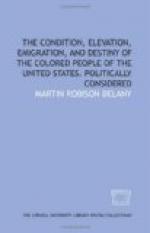For a concise historical arrangement of colored men, who braved the dangers of the battlefield, we are much indebted to William C. Nell, Esq., formerly of Boston, now of Rochester, N.Y., for a pamphlet, published by him during the last year, which should be read by every American the country through.
For ten years previous, a dissatisfaction had prevailed among the colonists, against the mother country, in consequence of the excessive draughts of supplies, and taxation, made upon them, for the support of the wars carried on in Europe. The aspect began to change, the light grew dim, the sky darkened, the clouds gathered lower and lower, the lightning glimmered through the black elements around—the storm advanced, until on the fifth of March, 1773, it broke out in terrible blasts, drenching the virgin soil of America, with the blood of her own native sons—Crispus Attuck, a colored man, was the first who headed, the first who commanded, the first who charged, who struck the first blow, and the first whose blood was spilt, and baptized the colony, as a peace-offering on the altar of American liberty. “The people were greatly exasperated. The multitude, armed with clubs, ran towards King street, crying, ’Let us drive out the ribalds; they have no business here!’ The rioters rushed furiously towards the Custom House; they approached the sentinel crying, ‘Kill him, kill him!’ They assaulted him with snowballs, pieces of ice, and whatever they could lay their hands upon. They encountered a band of the populace led by a mulatto named Attucks, who brandished their clubs and pelted them with snow-balls. The maledictions, the imprecations, the execrations of the multitudes were horrible. In the midst of a torrent of invectives from every quarter, the military were challenged to fire. The populace advanced to the points of the bayonets; the soldiers appeared like statues; the cries, the howlings, the menaces, the violent din of bells still sounding the alarm, increased the confusion and the horrors of these moments: at length the mulatto and twelve of his companions, pressing forward environed the soldiers, and striking their muskets with their clubs cried to the multitude: ’Be not afraid, they dare not fire; why do you hesitate, why do you not kill them, why not crush them at once?’ The mulatto lifted his arm against Captain Preston, having turned one of the muskets, he seized the bayonet with his left hand, as if he intended to execute his threat. At this moment confused cries were heard:




